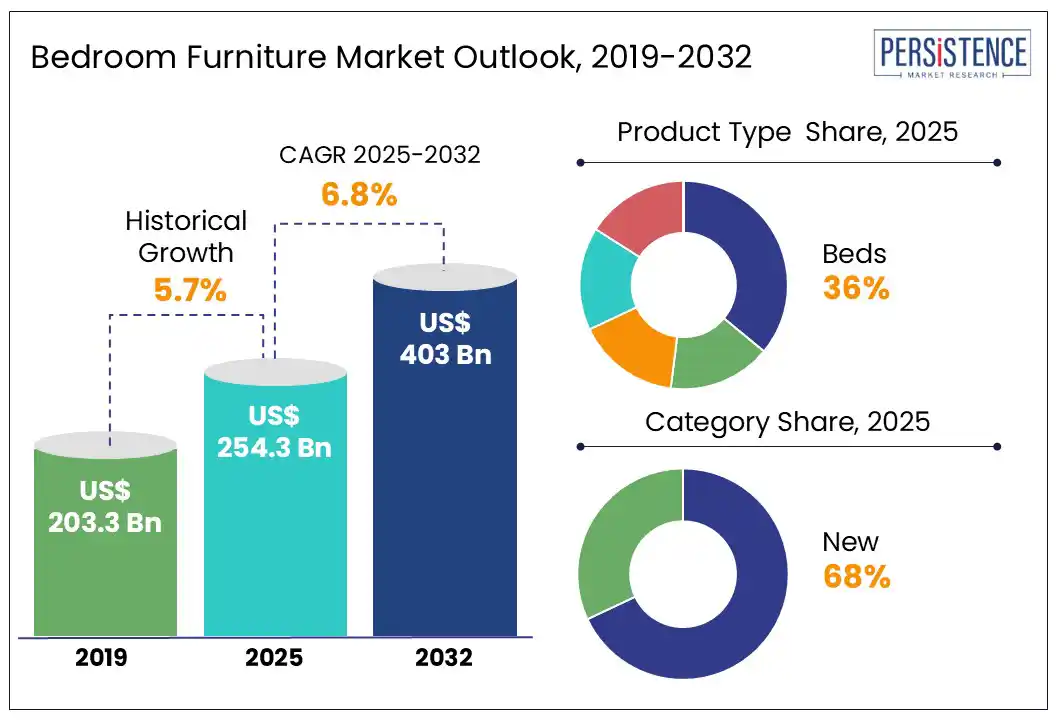ID: PMRREP35397| 189 Pages | 2 Jun 2025 | Format: PDF, Excel, PPT* | Consumer Goods

The global bedroom furniture market size is projected to grow from US$ 254.3 billion in 2025 to US$ 403.0 billion by 2032, with an expected CAGR of 6.8% during this period. According to the Persistence Market Research report, the furnishing industry is experiencing significant growth due to changing consumer preferences, technological advancements, and evolving lifestyles. The demand for bedroom furniture continues to increase as more individuals seek personalized, functional, and aesthetically pleasing living spaces, . This market offers a diverse range of products, including beds, dressers, wardrobes, and mattresses, serving both residential and commercial sectors. The growing trend towards home improvement, along with the rise of urbanization and compact living, has further intensified the demand for space-saving and multifunctional furniture.
Sustainability has become a major focus, with consumers increasingly opting for eco-friendly materials and choosing brands that are committed to environmental responsibility. The rapid expansion of e-commerce platforms has also made bedroom furniture more accessible, especially in emerging markets. As the industry continues to innovate, companies are experimenting with new designs, smart furniture solutions, and improved online shopping experiences to cater to a diverse global consumer base.

Key Industry Highlights
|
Global Market Attribute |
Key Insights |
|
Bedroom Furniture Market Size (2025E) |
US$ 254.3 Bn |
|
Market Value Forecast (2032F) |
US$ 403.0 Bn |
|
Projected Growth (CAGR 2025 to 2032) |
6.8% |
|
Historical Market Growth (CAGR 2019 to 2024) |
5.7% |
A growing emphasis on home aesthetics and interior design has been recognized as a key driver in the bedroom furniture market. Consumers are increasingly influenced by design trends showcased on social media and home improvement platforms, prompting a shift toward stylish, visually cohesive furniture over purely functional pieces. Bedrooms are now viewed as personal sanctuaries, leading to heightened demand for contemporary, minimalist, and customizable furniture that enhances the overall ambiance of living spaces.
In June 2024, Pottery Barn, a brand of Williams-Sonoma Inc., and Westin Hotels & Resorts collaborated. The Westin for Pottery Barn collection was introduced to replicate the luxurious sleep experience of Westin hotels in residential settings. The collection features the next-generation Heavenly Bed with cooling and comfort enhancements, paired with a sleek, curved bed frame crafted from light-finished solid hardwood. This initiative highlights how wellness and aesthetic appeal drives the preferences in modern bedroom furniture design.
The bedroom furniture market has been restrained by a combination of macroeconomic and evolving consumer preference factors. Inflation has driven up the prices of essential raw materials such as timber and steel, increasing production costs across the supply chain. At the same time, elevated interest rates have made it more expensive for consumers to finance large furniture purchases, thereby reducing discretionary spending on high-end bedroom sets.
Demand has been redirected toward practical, multifunctional designs that offer greater utility and value. Consumer tastes have shifted toward sustainability, with a heightened preference being observed, particularly in the UK, for furniture crafted from reclaimed wood or recycled materials. This eco-conscious mindset is reshaping purchasing behavior and adding pressure on traditional manufacturing practices.
An opportunity is being presented to bedroom furniture manufacturers through the expansion into modular and space-saving product lines, as urbanization continues to reduce average living space, especially in densely populated cities. Consumers are increasingly prioritizing compact, functional, and stylish solutions such as beds with integrated storage, foldable dressers, and multi-use wardrobes that optimize limited floor areas. This growing demand is driving innovation in adaptable furniture design, enabling manufacturers to cater to evolving urban lifestyles and unlock new market segments.
The launch of IKEA’s STOCKHOLM 2025 collection features 96 modular pieces, including versatile sofas and storage units designed for compact living. Emphasizing Scandinavian craftsmanship, the collection offers mix-and-match functionality with a variety of organic wood finishes like pine, beech, and oak, supporting personalized design aesthetics. With a continued focus on affordability, durability, and ease of transport, the collection underscores IKEA’s strategic response to consumer demand for flexible, space-efficient, and visually appealing bedroom solutions.
Beds have consistently led sales volumes in the bedroom furniture market, dominating both residential and hospitality end-user segments due to their essential role in sleep quality and overall comfort. As the centerpiece of any bedroom, beds have been prioritized by consumers seeking a blend of aesthetic appeal and ergonomic functionality. In residential spaces, strong demand has been fueled by preferences for stylish and supportive bed designs, while in the hospitality industry, hotels have increasingly invested in premium bedding to enhance guest experiences. This consistent demand has reinforced the centrality of beds in both functional and decorative contexts.
Williams-Sonoma Inc. reported a 5.7% increase in comparable sales, reflecting strong consumer demand for its premium offerings, including beds and bedroom furniture. This growth was attributed to heightened consumer interest in high-quality bedroom offerings, particularly beds crafted with superior materials and design. The data further underscores beds’ dominant position in the bedroom furniture market.
The new category continues to dominate the bedroom furniture market, driven by consumer demand for fresh, customized, and high-quality products. New furniture is highly sought after for its modern designs, durability, and warranty benefits, making it the preferred choice for both residential and commercial buyers. While refurbished and second-hand furniture has gained some traction due to its cost-effectiveness and sustainability appeal, it remains less dominant. New furniture is favored for its guaranteed condition, contemporary features, and alignment with evolving aesthetic and functional preferences.
In 2024, Pottery Barn, a brand under Williams-Sonoma Inc., launched several new collections, including the "Westin for Pottery Barn" collection, which brings the luxury of Westin Hotels to consumers' homes. Additionally, a collaboration with interior designer Mark D. Sikes has resulted in timeless and versatile pieces, reinforcing the preference for modern, high-quality bedroom furniture that meets both design and functional needs.

The rising demand for multifunctional bedroom furniture in North America is driven by the hybrid work and home living trends. As remote work and flexible schedules become more common, furniture that adapts to work and rest spaces has witnessed increased demand. Compact desks, fold-out tables, storage beds, and modular pieces are being sought after to maximize space and functionality.
IKEA's 2025 BRIMNES bed transforms from a single bed to a double bed and can also serve as a sofa, making it ideal for small spaces. The bed's two large drawers provide ample storage, catering to the need for efficient use of space in urban environments. Such designs are integrated into bedroom layouts to support both productivity and comfort. This shift reflects a broader market movement toward furniture solutions that cater to evolving lifestyle needs, highlighting the growing preference for multifunctional and adaptable pieces in modern living spaces.
Minimalist Scandinavian-inspired designs are becoming increasingly popular in the European bedroom furniture market. The preference for clean lines, functionality, and understated elegance aligns with the desire for simplicity and efficiency in living spaces. As a result, sleek, space-saving furniture made from natural materials, such as wood, and featuring neutral color palettes, is being prioritized. This minimalist trend is driven by the desire to create serene, clutter-free environments that promote relaxation and well-being.
In 2024, La-Z-Boy Incorporated partnered with DFS, a leading UK furniture retailer, to introduce a new line of recliner sofas. These sofas, designed with Scandinavian characteristics like clean lines and neutral colors, are manufactured at La-Z-Boy’s Lancashire facility in the UK, ensuring they meet European design standards and appeal to the minimalist tastes of European consumers. This partnership reflects La-Z-Boy’s commitment to offering contemporary, functional, and aesthetically pleasing furniture.
The surge in e-commerce platforms has significantly increased the accessibility of bedroom furniture in rural and semi-urban areas across the Asia Pacific region. Online retail channels are being utilized to reach consumers who previously had limited access to traditional furniture stores. This shift has been driven by the convenience of home delivery and the ability to browse a variety of products from different brands.
IKEA expanded its e-commerce presence in India by launching online sales in 10 cities, including Delhi-NCR, Amritsar, and Chandigarh, and plans to extend deliveries to 62 new districts in Maharashtra, Karnataka, Telangana, and Andhra Pradesh. The move targets tier-2 and tier-3 cities, where access to modern furniture has been challenging. By 2025, IKEA's e-commerce channel accounted for 30% of its revenue in India, highlighting the growing role of online retail in reaching underserved markets.
The competitive landscape of the global bedroom furniture market is characterized by a dynamic interplay between well-established multinational brands and innovative regional players. Leading companies command significant market share, bolstered by their extensive product selections and robust e-commerce strategies that cater to a variety of consumer tastes. Meanwhile, regional manufacturers distinguish themselves by offering unique, localized designs that resonate with cultural preferences, as well as a strong emphasis on sustainable practices, which particularly appeals to eco-conscious consumers.
In the rapidly expanding Asian market, major e-commerce platforms are capitalizing on the digital revolution to penetrate even the most remote areas, significantly broadening their customer base. As consumer preferences shift towards sustainability and technology integration, brands are increasingly adopting cutting-edge innovations and eco-friendly materials to set themselves apart from the competition. This evolution not only reflects the changing tastes of consumers but also highlights the importance of adapting to market trends to thrive in this vibrant sector.
The global bedroom furniture market is projected to be valued at 254.3 bn in 2025.
The bedroom furniture market is driven by growing emphasis on home aesthetics and interior design boosts the demand for stylish furniture.
The bedroom furniture market is poised to witness a CAGR of 6.8% from 2025 to 2032 or between 2025 and 2032.
Expansion into modular and space-saving furniture aligns with rising demand for urban compact living is the key market opportunity.
Major players in the Bedroom Furniture market include Williams-Sonoma Inc., Crystal Furnitech Pvt Ltd, RH, Inter IKEA Systems B.V., American Signature, Inc., and others.
|
Report Attribute |
Details |
|
Historical Data/Actuals |
2019 - 2024 |
|
Forecast Period |
2025 - 2032 |
|
Market Analysis Units |
Value: US$ Bn, Volume: Unit |
|
Geographical Coverage |
|
|
Segmental Coverage |
|
|
Competitive Analysis |
|
|
Report Highlights |
|
|
Customization and Pricing |
Available upon request |
By Product Type
By Category
By Material Type
By Distribution Channel
By End-use
By Region
Delivery Timelines
For more information on this report and its delivery timelines please get in touch with our sales team.
About Author